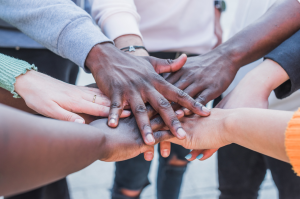Organizations committed to enhancing Diversity, Equity and Inclusion efforts (DEI) have built their teams with individuals from diverse backgrounds, experiences and perspectives to stimulate innovation and productivity. Working professionals are increasingly recognizing the value of this diversity and actively endeavouring to become better allies to foster collaboration and create psychologically safe environments where everyone feels valued and empowered to contribute.
Authentic allyship necessitates sincere self-reflection to understand our biases, privileges, and our role in addressing the challenges faced by marginalised groups. By examining the relationship between one’s personal identity and social justice, we cultivate empathy and empowerment to effect meaningful change.
This guide seeks to offer a structure for self-reflection to support your path as an ally. Remember, allyship is an ongoing process without a definitive endpoint. As the DEI landscape continues to evolve, there will always be new perspectives to grasp and ways to support your colleagues. Before delving in, it’s important to establish some fundamental expectations with allyship:
1
2
3
4
Always listen. Prioritise listening to the experiences, challenges and feedback of underrepresented groups.
Nobody’s perfect. Acknowledge that missteps are part of the process as are opportunities to unlearn and relearn. No one will always know everything.
Let go of assumptions. Avoid the expectation that marginalised individuals should serve as your educators on DEI topics and allyship; recognize that not all marginalised individuals are oppressed or experience oppression the same way.
It’s not about you. Understand that the aim of allyship is to embrace the concerns and challenges of marginalized groups as your own and avoid placing yourself at the forefront of their experiences.
1. Acknowledge Your Privilege
Reflect on the dimensions of your social identity and consider the privileges that stem from them. These dimensions encompass aspects such as race, ethnicity, gender, ability, sexual orientation, socioeconomic status, and age.
Privilege is an advantage available to specific individuals or groups. Simultaneously, everyone has some form of privilege based on the dimensions of their identity. Acknowledging these privileges isn’t about fostering guilt, but rather about cultivating empathy and awareness.
Questions to Consider
- What privileges am I afforded as a result of my social identity? Consider how your demographic makeup intersects.
- How might your privilege shape your experiences or interactions?
- How does your privilege disadvantage others?
- How does your privilege change based on context and company?
2. Research
Dedicate time to familiarise yourself with the historical and present challenges confronted by marginalized groups, along with their aspirations for progress. Education has become more readily available to a growing number of people, with information easily accessible as long as individuals are motivated to learn. For example, along with longer-form content like articles and podcasts, shorter formats on social media accounts deliver impactful educational content throughout your day.
In the workplace, we encourage employees to leverage their company’s employee resource groups (ERGs), events and available training modules. In your participation, prioritize listening to the experiences and perspectives shared without centering yourself in the conversation.
Questions to Consider
- What challenges or barriers have marginalized groups encountered in the past? What persists today?
- What change do they hope to accomplish towards a better future?
- What are examples of biases or microaggressions that they may encounter
- What workplace-related barriers, biases or microaggressions could arise?
3. Examine Your Biases
Take note of your implicit biases and how they shape your perceptions and behaviours. Challenge yourself to acknowledge and dismantle these biases through education and introspection. While you take stock, put yourself in the shoes of those who experience these biases and contemplate their effects.
Questions to Consider
- What biases do you hold?
- How have these biases shaped your perceptions and behaviours? Why do you think you have formed these beliefs?
- What impact do these biases and behaviours have on the people of these groups?
- How might they have impacted your actions and decision-making in the workplace?
- How might they impact your interactions and relations with others?
4. Take Action
Consider how you can leverage your privilege and resources to support marginalized communities, both within and beyond the workplace. In a workplace setting, this might entail active involvement in ERGs or taking advantage of any relevant training opportunities. In addition, it’s crucial to actively listen to and amplify the voices of your marginalized colleagues, ensuring their perspectives are not only heard but also valued and acted upon.
Remember, allyship is a continuous journey, with ongoing self-reflection as a vital component. In your daily life, take note of your experiences, feedback, thoughts and mistakes and use them to inform your learning. Continue to dedicate time to reflect on these observations. For instance, if you inadvertently expressed a microaggression, reflect on how you handled the situation, the biases underlying your actions, and consider alternative approaches for the future. (Review our strategies on responding to microaggressions here!)
Final Words
Self-reflection is a fundamental aspect of authentic allyship, enabling us to recognize our privileges, biases and areas for growth. While this journey may sometimes be uncomfortable, acknowledging our mistakes helps to identify areas in need of unlearning and relearning.
Employers can also work with their ERGs to develop allyship initiatives and provide workshops or e-learning modules, empowering employees to strive for allyship excellence. By integrating these initiatives into their existing DEI strategy, employers demonstrate their commitment to an inclusive workplace conducive to thriving allyship, thereby fostering enhanced teamwork, innovation, and employee satisfaction.
Through engaging in introspective practices and actively addressing our own complicity, we can become empathetic and impactful allies to our colleagues in the workplace. Intentional allyship efforts allow workplaces not only embrace diversity but also cultivate inclusive cultures where every individual can thrive and succeed.




